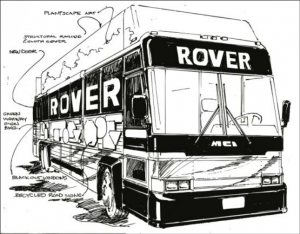Transportation bus becomes hands-on classroom

April 26, 2012
Beehives and composts are just a few of the items that might be aboard southern Illinois’ version of the Magic School Bus.
The Repurposed Outreach Vehicle for Education and Research is a bus Andrew Podoll, an SIU alumnus, purchased to bring science and ecology experiments to students across the region.
Podoll said the idea for the Eco ROVER project began in 2007 when, as a graduate student, he started a partnership with teachers across southern Illinois to develop curriculum around hands-on learning models. He would take his truck to schools ranging from elementary to high school and bring in participation-based experiments and lessons such as a model river system, organic and inorganic fertilizers, and creating fossils for students.
Advertisement
Podoll said the students are always excited for his lessons.
“Kids want to get their hands dirty,” he said. “But it’s an opportunity to learn. If you can control that environment a little bit and harness their energy, it can be very productive.”
The project is beneficial for students with learning disabilities as well, Podoll said, because they don’t have to read a textbook and regurgitate information or fill in circles on an exam.
It’s helpful for teachers, too, because they can take away from the lessons and use them in the classroom, he said. Podoll also visited the SIU campus Thursday.
Podoll said he started to think about how inefficient his truck was because of limited space and how he could bring his work to a bigger scale. That’s when the thought for a bus came to him, he said.
“I was just joking around with some friends,” he said. “They said, ‘Yeah, a bus, Andrew. Nice.’”
In September 2010, the joke became a reality.
Advertisement*
On a road trip through Hannibal, Mo., Podoll saw a used bus for sale, and within seven days, he said he made the purchase.
With the bus, Podoll said he wants to take the hands-on learning experience to the next level. He said he wants projects such as a green roof and composts. He said he even wants a beehive on the inside with a bumpout area in the back where students can watch the bees pollinate the plants.
The main goal, Podoll said, is for all the hands-on modules to be connected like a miniature ecosystem.
The cost of the finished product will be at least $80,000, he said. This could be problematic because the project was deemed a not-for-profit organization in September 2010, which means all funds must be from donations and fundraisers.
“That way, we can provide free resources for schools,” he said.
So far, from fundraisers and private donations, Podoll said the organization has managed to raise around $10,500. He also has a pending grant application with Old National Bank for $12,000.
He said he wishes he could wait to uncover the bus as a finished product for a wow-factor, but considering how slow the process has become, he doesn’t think it is a realistic idea.
In the meantime, Podoll said he still travels to schools for lessons and takes the bus with him so the community will see how he is still active in the project.
One class he frequently visits is Marba Bertling’s fifth-grade class at Jefferson Elementary School in Marion. She said on his first visit, he gave a presentation on his visit to Antarctica.
“From that moment on, I begged him to come back to my class,” she said.
Podoll does experiments of all kinds with the class, Bertling said. One experiment, for example, was when the class put garlic in with carnation flowers to see if the plants absorbed the scent.
She said the way he relates to the kids is unbelievable.
“As far as I’m concerned, science is more of a fine arts, because it’s something that has to be experienced,” Bertling said. “It’s not just a subject you can teach out of a book, and that’s what he did. He took it out of the book.”
Sally O’Leary, a science teacher at Murphysboro High School, was the first teacher Podoll worked with on the project. She said the two would go through her lesson plans and tweak them to be more hands-on. Many students come back to O’Leary to ask how Podoll is doing, she said.
As far as getting the money for the bus, O’Leary said she is hopeful for Podoll.
“He’s very charismatic. Every teacher will tell another teacher, and hopefully the word will spread,” she said.
Bertling said it’s going to be hard to raise the money, because financial times are hard for schools, but she’s positive Podoll will get the bus completed.
“If Andrew Podoll is behind it, I will not just hope for it,” she said. “It will happen.”
Advertisement







